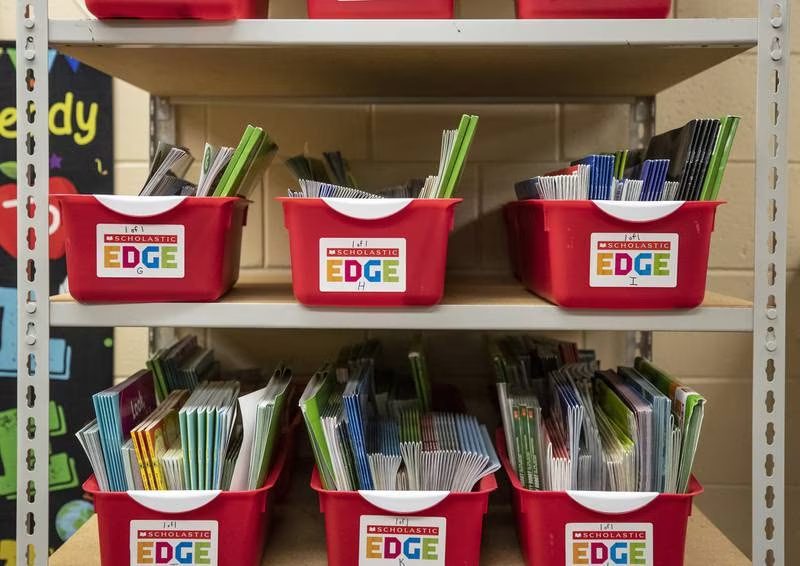
New state rules tell school librarians to ‘err on side of caution’ when picking books
South Florida Sun-Sentinel | By Leslie Postal and Scott Travis | January 18, 2023
Florida’s school librarians face new scrutiny, and even the threat of criminal prosecution, under a new state rule adopted Wednesday that urges them to “err on the side of caution” when selecting books for their campuses.
The rule approved by the State Board of Education stems from a new 2022 state law pushed by Republican leaders. Critics say it will have a “chilling effect” on educators and will allow those with conservative views to dictate what books all Florida students can select at their schools.
“This is no free state of Florida. This is a state that censors books, censors educators, and censors students and families,” Broward School Board member Sarah Leonardi said. “It is a state that seeks to limit access to knowledge and resources that don’t fit in a conservative ideological box. … It is a state that is making it more and more difficult to educate or parent a child without constant fear of retribution.”
But supporters say the new law, rule and training provide much-needed scrutiny of books in media centers and classrooms and more ways for parents to learn what is on school shelves.
“We have seen time and time again questionable and inappropriate material that has entered our schools,” said Paul Burns, deputy chancellor for educator quality at the Florida Department of Education, at Wednesday’s state board meeting.
He said the new required training for school media specialists will help ensure the “appropriateness” of books available in schools.
The board unanimously approved the rule after hearing from about 15 speakers, most representing conservative groups that wanted even stricter prohibitions and who complained the new rule contained a “loophole” that would allow some books with sexual content to be approved because they have literary merit.
Those speakers included a man with the group No Left Turn in Education who said he’d challenged 500 books in Clay County schools, and several members of Moms for Liberty, which had two members on the state panel tapped to help draft the new training. The group has pushed for books to be removed from school libraries across the state.
Michelle Beavers, chair of the Brevard County’s moms group and a member of that workgroup, said her goal was strong language that “tells librarians, ‘You need to be careful and make sure it has serious literary value before it comes into our library.’”
Another mother said, “Not all literature is beneficial to students.”
Tom Grady, the board’s chair, said those were “helpful comments” and asked if the board could consider their worries about a “loophole.” But a department attorney told the board what was described as a “loophole” was Florida’s law on pornography, which says in part that books with sexual content or nudity are considered pornography only if they are “without serious literary, artistic, political, or scientific value for minors.”
The new training provides information on how to select books for school and classroom libraries and cautions teachers pornography is against the law and that distributing it to a minor is a felony. It tells media specialists, or teachers certified to run libraries, and teachers to find books that meet state standards and the age and reading level of their students and “support the broad racial, ethnic, socioeconomic and cultural diversity of the students of this state.”
But it is also full of warnings.
“Media specialists should always err on the side of caution when selecting materials,” says the narrator during the online training. “It is good practice to assess whether or not you, as an adult making book-selection decisions, would be comfortable reading aloud the material in question in a public meeting. If you would not be comfortable reading the material in a public setting, then you should lean toward not making the material available in a public school library for children.”
The training also tells teachers they should be careful buying books that were removed or restricted in other school districts.
The state’s moves are troubling, said Brian Knowles, who oversees Holocaust, African American, Latino and gender studies for Palm Beach County schools. He helps teachers and librarians select materials.
“What this is going to do is further embed the fear that a lot of educators have,” Knowles said. “A lot of this legislation is so ambiguous and up to interpretation. Most of us who are not experts in legal language won’t understand it, and the inclination will be to avoid anything with any kind of diversity or inclusion.”
Knowles was particularly alarmed by the suggestions that librarians can be charged with felonies if they select material that authorities consider improper.
“You’re threatening people’s freedoms,” he said. “You can be sent to prison? It’s so insane.”
Palm Beach County school administrators instructed teachers last spring to review their classroom libraries to see if there was anything related to sexual orientation, racial equity or other topics that might violate new state laws. The district has also removed several books dealing with LGBTQ issues, including “I Am Jazz,” which tells the story of a transgender child from South Florida.
Broward County recently identified 11 books that had been challenged by the local Moms for Liberty group for removal from school libraries or restricted to certain grade levels, including ones dealing with sex and LGBTQ themes.
If Gov. Ron DeSantis, who signed the legislation, and the state board want to protect parental rights and freedom, “they would support policies and rules that allow parents to put restrictions on their own children while not limiting others,” said Stephana Ferrell, a founder of the Florida Freedom to Read Project, in a text.
The board’s action “will most certainly limit our students’ freedom to read,” added Ferrell, whose group opposes efforts to restrict or remove books from public schools.
“The language … essentially begs for statewide book bans without making it an official ask of the state,” wrote Ferrell and other members of the Freedom to Read group in an email to the state board, asking it to vote against the rule.





